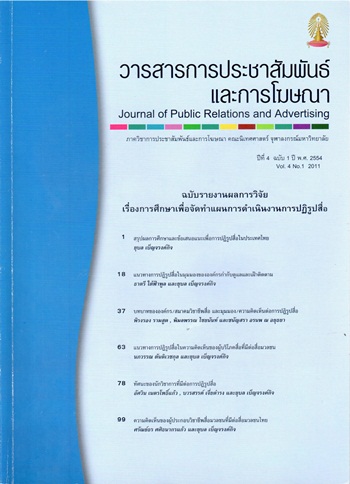สรุปผลการศึกษาและข้อเสนอแนะเพื่อการปฏิรูปสื่อในประเทศไทย
Main Article Content
Abstract
The idea of media reform in Thailand was stirred by situation namely; the emerging of new media community radio, community / satellite TV, the change in media technology / media consuming habits, political interference on free and community media and inadequacy of news in some media coverage as much as distortion of some crucial facts, issues on media content / violence / less social service. Moreover there were arguments about poor payment, welfare and work environment support for reporters while violations of privacy and reputations by media news coverage still continued.
Media reform process was started by using research findings to support reform recommendations. Data were collected from five involved groups; media organizations and employees, professional media associations, academics, media consumers and other concerned groups e.g. media regulator and NGOs by means of in depth interviews, focus groups and survey.
Findings showed that most groups view media as performing well in timing and rapid reporting and reporters see themselves doing best in reporting to keep benefits of the country. All groups see reporters doing less in privacy protection and more on violation of reputation. Most reporters said they received low payment comparing to those who graduated with the same degree and they were not provided enough security and protection during unrest. Most groups concerned with freedom in posting on the internet (facts or non-facts) as well as pornographic content, violence, hate speech, and social divide. There are disagreement on media ownership, some rejected government ownership saying it gave ways to interference of news coverage while government media said others were interfered by business or political parties too.
For recommendations of media reform, the media organizations should increase minimum wage and welfare (enforcement of labor law) for media employee. There should be consultation center organized by representatives from various groups without conflict of interest for media consumer complaint. Accreditation system for media organizations is strongly recommended. Time and space for public affairs and services in media content should be allocated. Other recommendations are such as formal education and social campaign in media literacy, community media watch and on-line media watch.


